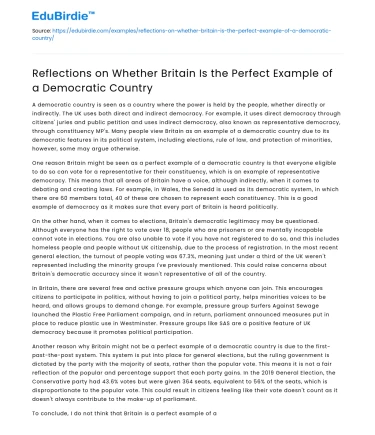A democratic country is seen as a country where the power is held by the people, whether directly or indirectly. The UK uses both direct and indirect democracy. For example, it uses direct democracy through citizens' juries and public petition and uses indirect democracy, also known as representative democracy, through constituency MP's. Many people view Britain as an example of a democratic country due to its democratic features in its political system, including elections, rule of law, and protection of minorities, however, some may argue otherwise.
One reason Britain might be seen as a perfect example of a democratic country is that everyone eligible to do so can vote for a representative for their constituency, which is an example of representative democracy. This means that all areas of Britain have a voice, although indirectly, when it comes to debating and creating laws. For example, in Wales, the Senedd is used as its democratic system, in which there are 60 members total, 40 of these are chosen to represent each constituency. This is a good example of democracy as it makes sure that every part of Britain is heard politically.
Save your time!
We can take care of your essay
- Proper editing and formatting
- Free revision, title page, and bibliography
- Flexible prices and money-back guarantee
On the other hand, when it comes to elections, Britain's democratic legitimacy may be questioned. Although everyone has the right to vote over 18, people who are prisoners or are mentally incapable cannot vote in elections. You are also unable to vote if you have not registered to do so, and this includes homeless people and people without UK citizenship, due to the process of registration. In the most recent general election, the turnout of people voting was 67.3%, meaning just under a third of the UK weren't represented including the minority groups I've previously mentioned. This could raise concerns about Britain's democratic accuracy since it wasn't representative of all of the country.
In Britain, there are several free and active pressure groups which anyone can join. This encourages citizens to participate in politics, without having to join a political party, helps minorities voices to be heard, and allows groups to demand change. For example, pressure group Surfers Against Sewage launched the Plastic Free Parliament campaign, and in return, parliament announced measures put in place to reduce plastic use in Westminster. Pressure groups like SAS are a positive feature of UK democracy because it promotes political participation.
Another reason why Britain might not be a perfect example of a democratic country is due to the first-past-the-post system. This system is put into place for general elections, but the ruling government is dictated by the party with the majority of seats, rather than the popular vote. This means it is not a fair reflection of the popular and percentage support that each party gains. In the 2019 General Election, the Conservative party had 43.6% votes but were given 364 seats, equivalent to 56% of the seats, which is disproportionate to the popular vote. This could result in citizens feeling like their vote doesn't count as it doesn't always contribute to the make-up of parliament.
To conclude, I do not think that Britain is a perfect example of a democratic country since its election results are not representative of the whole country's votes.






 Stuck on your essay?
Stuck on your essay?

